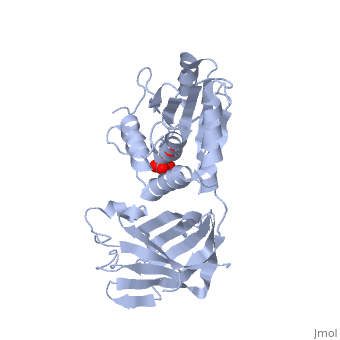1d5r
From Proteopedia
| Line 4: | Line 4: | ||
|PDB= 1d5r |SIZE=350|CAPTION= <scene name='initialview01'>1d5r</scene>, resolution 2.1Å | |PDB= 1d5r |SIZE=350|CAPTION= <scene name='initialview01'>1d5r</scene>, resolution 2.1Å | ||
|SITE= | |SITE= | ||
| - | |LIGAND= <scene name='pdbligand=TLA:L(+)-TARTARIC ACID'>TLA</scene> | + | |LIGAND= <scene name='pdbligand=TLA:L(+)-TARTARIC+ACID'>TLA</scene> |
| - | |ACTIVITY= [http://en.wikipedia.org/wiki/Protein-tyrosine-phosphatase Protein-tyrosine-phosphatase], with EC number [http://www.brenda-enzymes.info/php/result_flat.php4?ecno=3.1.3.48 3.1.3.48] | + | |ACTIVITY= <span class='plainlinks'>[http://en.wikipedia.org/wiki/Protein-tyrosine-phosphatase Protein-tyrosine-phosphatase], with EC number [http://www.brenda-enzymes.info/php/result_flat.php4?ecno=3.1.3.48 3.1.3.48] </span> |
|GENE= | |GENE= | ||
| + | |DOMAIN= | ||
| + | |RELATEDENTRY= | ||
| + | |RESOURCES=<span class='plainlinks'>[http://oca.weizmann.ac.il/oca-docs/fgij/fg.htm?mol=1d5r FirstGlance], [http://oca.weizmann.ac.il/oca-bin/ocaids?id=1d5r OCA], [http://www.ebi.ac.uk/pdbsum/1d5r PDBsum], [http://www.rcsb.org/pdb/explore.do?structureId=1d5r RCSB]</span> | ||
}} | }} | ||
| Line 14: | Line 17: | ||
==Overview== | ==Overview== | ||
The PTEN tumor suppressor is mutated in diverse human cancers and in hereditary cancer predisposition syndromes. PTEN is a phosphatase that can act on both polypeptide and phosphoinositide substrates in vitro. The PTEN structure reveals a phosphatase domain that is similar to protein phosphatases but has an enlarged active site important for the accommodation of the phosphoinositide substrate. The structure also reveals that PTEN has a C2 domain. The PTEN C2 domain binds phospholipid membranes in vitro, and mutation of basic residues that could mediate this reduces PTEN's membrane affinity and its ability to suppress the growth of glioblastoma tumor cells. The phosphatase and C2 domains associate across an extensive interface, suggesting that the C2 domain may serve to productively position the catalytic domain on the membrane. | The PTEN tumor suppressor is mutated in diverse human cancers and in hereditary cancer predisposition syndromes. PTEN is a phosphatase that can act on both polypeptide and phosphoinositide substrates in vitro. The PTEN structure reveals a phosphatase domain that is similar to protein phosphatases but has an enlarged active site important for the accommodation of the phosphoinositide substrate. The structure also reveals that PTEN has a C2 domain. The PTEN C2 domain binds phospholipid membranes in vitro, and mutation of basic residues that could mediate this reduces PTEN's membrane affinity and its ability to suppress the growth of glioblastoma tumor cells. The phosphatase and C2 domains associate across an extensive interface, suggesting that the C2 domain may serve to productively position the catalytic domain on the membrane. | ||
| - | |||
| - | ==Disease== | ||
| - | Known diseases associated with this structure: Bannayan-Riley-Ruvalcaba syndrome OMIM:[[http://www.ncbi.nlm.nih.gov/entrez/dispomim.cgi?id=601728 601728]], Cowden disease OMIM:[[http://www.ncbi.nlm.nih.gov/entrez/dispomim.cgi?id=601728 601728]], Endometrial carcinoma OMIM:[[http://www.ncbi.nlm.nih.gov/entrez/dispomim.cgi?id=601728 601728]], Lhermitte-Duclos syndrome OMIM:[[http://www.ncbi.nlm.nih.gov/entrez/dispomim.cgi?id=601728 601728]], Macrocephaly/autism s OMIM:[[http://www.ncbi.nlm.nih.gov/entrez/dispomim.cgi?id=601728 601728]], Meningioma OMIM:[[http://www.ncbi.nlm.nih.gov/entrez/dispomim.cgi?id=601728 601728]], Oligodendroglioma OMIM:[[http://www.ncbi.nlm.nih.gov/entrez/dispomim.cgi?id=601728 601728]], Prostate cancer OMIM:[[http://www.ncbi.nlm.nih.gov/entrez/dispomim.cgi?id=601728 601728]], Proteus syndrome OMIM:[[http://www.ncbi.nlm.nih.gov/entrez/dispomim.cgi?id=601728 601728]], Thyroid carcinoma, follicular OMIM:[[http://www.ncbi.nlm.nih.gov/entrez/dispomim.cgi?id=601728 601728]], VATER association with hydrocephalus OMIM:[[http://www.ncbi.nlm.nih.gov/entrez/dispomim.cgi?id=601728 601728]] | ||
==About this Structure== | ==About this Structure== | ||
| Line 31: | Line 31: | ||
[[Category: Pavletich, N P.]] | [[Category: Pavletich, N P.]] | ||
[[Category: Yang, H.]] | [[Category: Yang, H.]] | ||
| - | [[Category: TLA]] | ||
[[Category: c2 domain]] | [[Category: c2 domain]] | ||
[[Category: phosphotase]] | [[Category: phosphotase]] | ||
[[Category: phosphotidylinositol]] | [[Category: phosphotidylinositol]] | ||
| - | ''Page seeded by [http://oca.weizmann.ac.il/oca OCA ] on | + | ''Page seeded by [http://oca.weizmann.ac.il/oca OCA ] on Sun Mar 30 19:35:08 2008'' |
Revision as of 16:35, 30 March 2008
| |||||||
| , resolution 2.1Å | |||||||
|---|---|---|---|---|---|---|---|
| Ligands: | |||||||
| Activity: | Protein-tyrosine-phosphatase, with EC number 3.1.3.48 | ||||||
| Resources: | FirstGlance, OCA, PDBsum, RCSB | ||||||
| Coordinates: | save as pdb, mmCIF, xml | ||||||
CRYSTAL STRUCTURE OF THE PTEN TUMOR SUPPRESSOR
Overview
The PTEN tumor suppressor is mutated in diverse human cancers and in hereditary cancer predisposition syndromes. PTEN is a phosphatase that can act on both polypeptide and phosphoinositide substrates in vitro. The PTEN structure reveals a phosphatase domain that is similar to protein phosphatases but has an enlarged active site important for the accommodation of the phosphoinositide substrate. The structure also reveals that PTEN has a C2 domain. The PTEN C2 domain binds phospholipid membranes in vitro, and mutation of basic residues that could mediate this reduces PTEN's membrane affinity and its ability to suppress the growth of glioblastoma tumor cells. The phosphatase and C2 domains associate across an extensive interface, suggesting that the C2 domain may serve to productively position the catalytic domain on the membrane.
About this Structure
1D5R is a Single protein structure of sequence from Homo sapiens. Full crystallographic information is available from OCA.
Reference
Crystal structure of the PTEN tumor suppressor: implications for its phosphoinositide phosphatase activity and membrane association., Lee JO, Yang H, Georgescu MM, Di Cristofano A, Maehama T, Shi Y, Dixon JE, Pandolfi P, Pavletich NP, Cell. 1999 Oct 29;99(3):323-34. PMID:10555148
Page seeded by OCA on Sun Mar 30 19:35:08 2008

